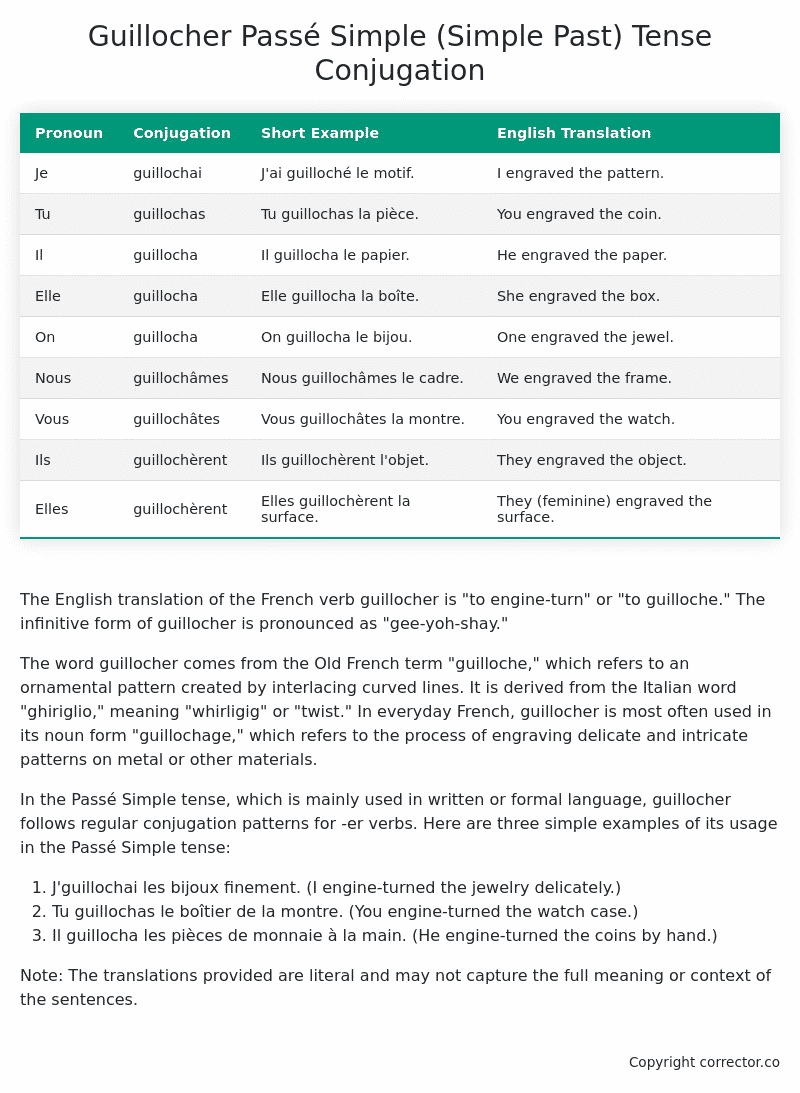Passé Simple (Simple Past) Tense Conjugation of the French Verb guillocher
Introduction to the verb guillocher
The English translation of the French verb guillocher is “to engine-turn” or “to guilloche.” The infinitive form of guillocher is pronounced as “gee-yoh-shay.”
The word guillocher comes from the Old French term “guilloche,” which refers to an ornamental pattern created by interlacing curved lines. It is derived from the Italian word “ghiriglio,” meaning “whirligig” or “twist.” In everyday French, guillocher is most often used in its noun form “guillochage,” which refers to the process of engraving delicate and intricate patterns on metal or other materials.
In the Passé Simple tense, which is mainly used in written or formal language, guillocher follows regular conjugation patterns for -er verbs. Here are three simple examples of its usage in the Passé Simple tense:
- J’guillochai les bijoux finement. (I engine-turned the jewelry delicately.)
- Tu guillochas le boîtier de la montre. (You engine-turned the watch case.)
- Il guillocha les pièces de monnaie à la main. (He engine-turned the coins by hand.)
Note: The translations provided are literal and may not capture the full meaning or context of the sentences.
Table of the Passé Simple (Simple Past) Tense Conjugation of guillocher
| Pronoun | Conjugation | Short Example | English Translation |
|---|---|---|---|
| Je | guillochai | J’ai guilloché le motif. | I engraved the pattern. |
| Tu | guillochas | Tu guillochas la pièce. | You engraved the coin. |
| Il | guillocha | Il guillocha le papier. | He engraved the paper. |
| Elle | guillocha | Elle guillocha la boîte. | She engraved the box. |
| On | guillocha | On guillocha le bijou. | One engraved the jewel. |
| Nous | guillochâmes | Nous guillochâmes le cadre. | We engraved the frame. |
| Vous | guillochâtes | Vous guillochâtes la montre. | You engraved the watch. |
| Ils | guillochèrent | Ils guillochèrent l’objet. | They engraved the object. |
| Elles | guillochèrent | Elles guillochèrent la surface. | They (feminine) engraved the surface. |
Other Conjugations for Guillocher.
Le Present (Present Tense) Conjugation of the French Verb guillocher
Imparfait (Imperfect) Tense Conjugation of the French Verb guillocher
Passé Simple (Simple Past) Tense Conjugation of the French Verb guillocher (You’re reading it right now!)
Passé Composé (Present Perfect) Tense Conjugation of the French Verb guillocher
Futur Simple (Simple Future) Tense Conjugation of the French Verb guillocher
Futur Proche (Near Future) Tense Conjugation of the French Verb guillocher
Plus-que-parfait (Pluperfect) Tense Conjugation of the French Verb guillocher
Passé Antérieur (Past Anterior) Tense Conjugation of the French Verb guillocher
Futur Antérieur (Future Anterior) Tense Conjugation of the French Verb guillocher
Subjonctif Présent (Subjunctive Present) Tense Conjugation of the French Verb guillocher
Subjonctif Passé (Subjunctive Past) Tense Conjugation of the French Verb guillocher
Subjonctif Imparfait (Subjunctive Imperfect) Tense Conjugation of the French Verb guillocher
Subjonctif Plus-que-parfait (Subjunctive Pluperfect) Tense Conjugation of the French Verb guillocher
Conditionnel Présent (Conditional Present) Tense Conjugation of the French Verb guillocher
Conditionnel Passé (Conditional Past) Tense Conjugation of the French Verb guillocher
Conditionnel Passé II (Conditional Past II) Tense Conjugation of the French Verb guillocher
L’impératif Présent (Imperative Present) Tense Conjugation of the French Verb guillocher
L’impératif Passé (Imperative Past) Tense Conjugation of the French Verb guillocher
L’infinitif Présent (Infinitive Present) Tense Conjugation of the French Verb guillocher
L’infinitif Passé (Infinitive Past) Tense Conjugation of the French Verb guillocher
Le Participe Présent (Present Participle) Tense Conjugation of the French Verb guillocher
Le Participe Passé (Past Participle) Tense Conjugation of the French Verb guillocher
Struggling with French verbs or the language in general? Why not use our free French Grammar Checker – no registration required!
Get a FREE Download Study Sheet of this Conjugation 🔥
Simply right click the image below, click “save image” and get your free reference for the guillocher Passé Simple tense conjugation!

Guillocher – About the French Passé Simple (Simple Past) Tense
Formation
Usage
Narration
Historical Context
Interactions with other tenses
Passé Composé
Imparfait
Conditional and Subjunctive
Summary
I hope you enjoyed this article on the verb guillocher. Still in a learning mood? Check out another TOTALLY random French verb conjugation!


